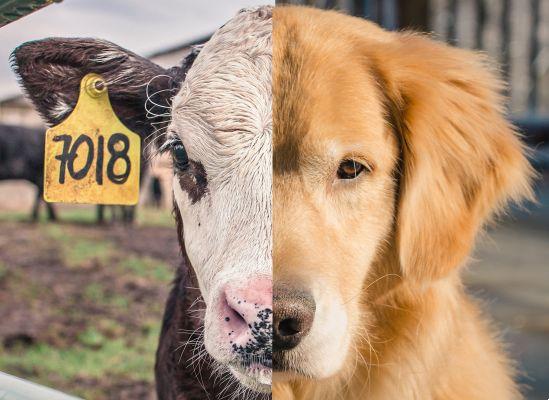Speciesism is a form of discrimination against those who do not belong to a particular species. Human beings have speciesist behavior in relation to other animals, placing their interests always above the interests of non-human animals.
Ideologically, humans consider themselves superior beings to the other animals that live on our planet. In this way, the rights of animals are left aside to meet the desires of human beings.
In this article, we will explain the concept of speciesism, in addition to addressing concepts such as anthropocentrism and anti-speciesism.
what is speciesism
Like racism, sexism and other types of discrimination, speciesism uses arguments without a moral or scientific basis to legitimize animal exploitation and suffering and the subjugation of one species over another.

Speciesism is similar to racism and sexism in that it disregards the interests of a specific group based on arbitrary criteria. This prejudice has a great impact on the lives of those who are discriminated against.
Speciesism is not just a matter of hatred, but of ignoring or belittling the feelings of animals. To renounce speciesism is to defend equality and respect for all beings who are capable of feeling emotions.
Main speciesist arguments
Often, without thinking, we resort to speciesist arguments to justify cruelty to animals. Claiming that other animals are not endowed with intelligence like us and that, therefore, they do not understand what humans do with them, for example, is one of these justifications.
However, in supporting this argument, we forget that not all human beings have the same reasoning ability. Are we thus justifying abuse against children or people with a cognitive disability, for example? Intelligence cannot in any way be the basis for any discrimination.
Another widely used argument is that, if the world has always been like this, why change it now? For a long time, human beings enslaved other human beings of different ethnicities than their own. Just because this has happened throughout history does not make it acceptable for us to enslave other animals. Just because they are different from us doesn't mean we shouldn't empathize with them.
There are those who also defend that human beings have feelings, unlike animals. However, we already know that animals are sentient beings, that is, they experience feelings such as pain and pleasure.
Therefore, all animals must be respected equally, as they all have the ability to suffer, feel pain, happiness and other emotions.
Finally, one of the most selfish arguments is that human beings need to eat meat to survive. Several studies show that man can live with foods of plant origin, and that animal protein is not essential for his existence.
Fortunately, over the years, the number of vegans around the world is increasing, and more and more people understand that it is not necessary to feed on animal suffering. On the contrary, a plant-based diet tends to be much healthier and more varied.
Anthropocentrism
This form of speciesism, which differentiates human beings from other animals, is also known as anthropocentric speciesism. Since anthropocentrism is a philosophical thought that places man as a central figure in the functioning of the universe, this type of speciesism demeans all those who are not part of the human species.

Considering them as inferior beings, humans treat animals as objects, using them as raw material for various products, as laboratory test subjects, as well as for food, transportation and entertainment, without taking into account what these actions do. provoke them.
Within speciesism, animals are classified in different ways, according to their species. At the same time that some animals are loved and considered as pets, others are exploited by large industries and agriculture.
Even dogs and cats, which are often considered part of the family and to which people dedicate time, care and affection, are also exploited by kennels that are true puppy mills, being sold as merchandise.
By differentiating ourselves from “irrational” beings, we do not take into account that animals are endowed with feelings just like us, like calves, who suffer from being separated from their mothers in the dairy industry. Even a fish, endowed with a sophisticated nervous system, feels pain when pulled out of the water.
Anti-speciesism
Coming against speciesism, anti-speciesism is an ideological, social and political movement against animal suffering and exploitation. Anti-speciesism advocates equality among all sentient individuals, that is, those capable of feeling, without any distinction of species.
All beings that inhabit our planet have the same origin, so they must be treated with respect. Anti-speciesism sees the individual importance of each species. That is, all beings have their own interests that must be taken into account.
In addition to excluding the consumption of products of animal origin, anti-speciesism advocates the abolition of any practice harmful to animals, such as those in which animals are used for leisure, testing or any other action that would be inadmissible if performed with human beings.
Defending animal rights is just the tip of the iceberg of this movement. Anti-speciesism also points to animal exploitation as the main cause of environmental destruction, as is the case of agriculture. In addition, it also argues that the imbalance between man and nature is one of the reasons for recent environmental disasters.
How to be antispeciesist
Although nowadays animals are being exploited on a large scale, there are more and more groups of people claiming their rights and informing others about the consequences of speciesism.
Furthermore, it is not possible to talk about anti-speciesism without mentioning veganism, a philosophy that seeks to exclude the consumption of meat, milk and its derivatives and any other product of origin or tested on animals.

Anti-speciesism, however, is not a solitary movement. Everyone can do their part, but advances must also be taken to the legislative sphere. Although some laws have already been adopted to combat speciesism, much remains to be done.
Few countries in the world have strict legislation on banning animal testing for cosmetics. In Spain, of the 26 states of the national territory, only 12 prohibit animals as entertainment in circuses.
Most human beings naturally accept exploitation against other animals. This is because, from a very early age, we are culturally encouraged to consume the meat, milk, skin and all other parts of various animals.
Therefore, it is convenient for us to believe that other animals are inferior and therefore can be exploited. But, as rational animals that we are, it is up to us to take the ethical position of not accepting speciesism.
You may also like
- Learn about the relationship between the environment and spiritist conduct
- Discover the benefits of raising a pet
- Check out how respect is the greatest learning in life
Speciesism is just an ideology. By renouncing this discriminatory thinking, we are advocating equality for all animals, human and non-human. This does not mean that animals should have the same rights as us, but that respecting all animals is the only way to preserve the environment and the different species that inhabit it.

























